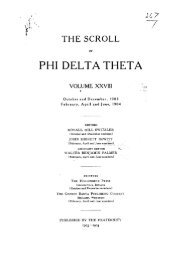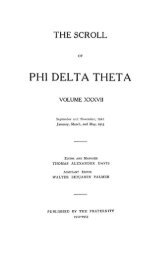1953–54 Volume 78 No 1–5 - Phi Delta Theta Scroll Archive
1953–54 Volume 78 No 1–5 - Phi Delta Theta Scroll Archive
1953–54 Volume 78 No 1–5 - Phi Delta Theta Scroll Archive
Create successful ePaper yourself
Turn your PDF publications into a flip-book with our unique Google optimized e-Paper software.
THE SCROLL of <strong>Phi</strong> <strong>Delta</strong> <strong>Theta</strong> for May, 1954 395<br />
to Pete Martin' stories. In stories written by<br />
me alone, the heat is really on me, myself,<br />
to try to make the story readable."<br />
When he uses the Dictaphone, he merely<br />
parks the desk mike on the table, uses a<br />
foot pedal to keep the thing rolling, and<br />
that's that. He finds that after a little while<br />
the one he's interviewing forgets the recorder.<br />
Occasionally he finds someone who<br />
is frightened by a microphone. If that happens,<br />
Pete falls back on the older, slower<br />
and clumsier method, pencil and notebook.<br />
Most of his stories come hard, as any<br />
writer will attest. The easier, and the most<br />
enjoyable, are the "author participation"<br />
assignments. These are the kind which<br />
finds Pete working for a day as a bit player<br />
in the movie "Command Decision" and reporting<br />
what happened to him in the experience.<br />
Another time he donned (just to<br />
show his versatility) a beautician's jacket<br />
and wrote "What Women Tell Their Hairdressers."<br />
As a part of covering the Hollywood<br />
beat, Pete really got in there and took part.<br />
He had a screen test, was made up to look<br />
like Ben Franklin and Will Rogers, played<br />
as an extra, and watched the daily miracles<br />
of sound men, producers, propmen, and<br />
other unsung specialists. He took Hedy<br />
Lamarr shopping, helped to put a Hollywood<br />
waitress through a studio glamorizing<br />
process (complete with falsies), and was<br />
himself a participant or observer in many<br />
Hollywood fantasies.<br />
The Hope story took a year, not in actual<br />
writing time, but in all of its aspects. It<br />
started with a contact with Hope in New<br />
York last February when the comedian was<br />
a guest of honor at a Friars dinner. When<br />
the Post lawyers finally negotiated a contract<br />
and a basis for working, Pete went<br />
to Cleveland to talk to Hope's brothers,<br />
boyhood friends and vaudeville partners.<br />
Thus armed with questions to ask Hope,<br />
Pete arrived in Beverly Hills in June to<br />
begin work. Before actually sitting down<br />
with Bob about the tenth of July Pete filled<br />
in the time by interviewing Hope's movie,<br />
radio and television pals and co-workers.<br />
"I finished interviewing Hope about six<br />
weeks later," Pete continues to relate. "My<br />
secretary transcribed the interviews, a process<br />
which took about a month and a half.<br />
After that my work was mostly with pencil,<br />
scissors, and pastepot. I finished the nine<br />
articles for the Post about the end of <strong>No</strong>vember.<br />
Then I went to Palm Springs to<br />
get Hope to read what he'd said, make<br />
changes and corrections in the copy, and<br />
OK it. I received the final okayed carbon<br />
from Hope the Monday after Christmas,<br />
an hour and a half before I took off on a<br />
two weeks' vacation, the first one I had all<br />
of last year and I needed it badly."<br />
With Crosby, Pete went to visit him at his<br />
summer home at Hayden Lake, Idaho, and<br />
worked with Bing for about two hours a<br />
day for five days. Later he got on the steamship<br />
Liberie with him (he was on his way<br />
to Europe to make "Little Boy Lost"), and<br />
they worked for two hours a day for six<br />
days. When Crosby returned from Europe<br />
Pete had another hour and a half session<br />
with him in New York. When the star went<br />
back to California he dictated a number<br />
of Dictaphone belts all by himself and airmailed<br />
them back to Pete.<br />
Working with Hope, Pete reports, wasn't<br />
that simple. Hope's life is a madhouse of<br />
multiple jobs. There's TV and day and<br />
night-time radio shows; there are movies,<br />
personal appearances, benefits he plays,<br />
flipping around the country on business or<br />
entertainment assignments.<br />
"It was all hell trying to get a date with<br />
him to actually go to work," recalls Pete.<br />
"Sometimes four or five days would elapse<br />
between interviews. With most Hollywood<br />
stars, the worst possible time to work with<br />
them is while they're making a movie. It's<br />
just the opposite with Hope. The time I<br />
chose to work with him was while he was<br />
working all day long, six days a week, on a<br />
forthcoming movie to be called 'Casanova's<br />
Big Night.' That was the only time I could<br />
be sure he'd stay in one place."<br />
Crosby considered himself a co-author.<br />
"Usually," comments Pete wryly, "when this<br />
happens it's a pain in the neck to a writer."<br />
However in Crosby's case it was a great<br />
help. He wrote into the manuscript not<br />
only sentences, but whole paragraphs, and<br />
each time he touched it, it sounded more<br />
like Crosby. "Crosby has a real gift for<br />
phrase making and a highly individual

















